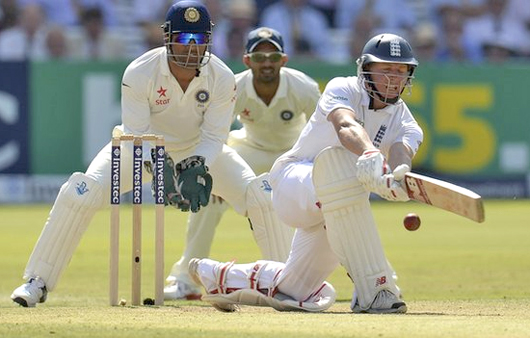London, Jul 20: It would be such a shame if the Anderson-Jadeja fracas becomes the central theme of the ongoing series between India and England rather than the cricket which on the evidence of play seen so far in the series has been enthralling.
There has been much speculation whether the matter could not have been amicably resolved, with some mutual back-slapping over a beer at the end of the second day’s day’s play of the first Test. That would have been ideal, of course, but clearly something was remiss.
Did the Indian team management overreact, as is being argued by many, especially in the English media? Hmm. Depends on which argument you give more weightage. What intrigues and concerns me, however, is that M S Dhoni should have become so implacable.The Indian captain is not known to be hawkish in such matters.
He is a pragmatist, sometimes even exhibiting a touch of the romantic. In 2011, for instance, he allowed Ian Bell to continue his innings ‘in the spirit of the game’ after the umpires had ruled him out.
What exactly transpired between Anderson and Jadeja is still mired in suspense and speculation but something seems to have snapped in the normally placid and resilient Dhoni to become rigid in his decision to lodge a Level 3 offence complaint against Anderson.
Now that England have countered India’s claims with a Level 2 offence charge against Jadeja, it has become a tug-o-war, ironically between two cricket boards who have only recently entered into some kind of brotherhood. The exact facts should be known on July 22, when the ICC-appointed judicial commissioner Gordon Lewis hears both parties. The cricket world waits with bated breath.
Frankly aggression by players is not disruptive; in fact I believe it adds flavour for spectators. Sport at this level is (and must be) played with deep passion and pride — for self, team and country. A namby-pamby, overly sanitized approach makes for a tepid spectacle for viewers.
That said, a line must be drawn where a legitimate contest turns into an unseemly conflict. Cricket is a not even a semi-contact sport by any reckoning, so physical abuse is an absolute no-no. And if verbal abuse extends to racist slurs, then it becomes reprehensible and worthy of the strictest punishment.
To take a different view of the issue, part of the problem in recent years in matters where players seem to take competitiveness to an avoidable level issues is the inability of on-field umpires to make a timely intervention and prevent things from getting out of hand.
This is largely because on-field umpires have had their powers considerably diminished. With third and fourth umpires, a match referee and invasive technology, almost every decision of the on-field umpire is not only under harsh scrutiny, but also reversible.
This has made them excessively defensive, not just in giving decisions but even in matters of maintaining control on the field. Players have always been prima donnas, but in the past, umpires were the final authority of discipline on the field.
It is hardly likely that on-field umpires can’t see tempers flaring and trouble brewing. If nipped in the bud, there is no threat to the match but if ignored and allowed to fester, it can become a problem for the sport itself.
Umpires like Frank Chester, Dickie Bird and even our own Piloo Reporter acquired legendary status with their no-nonsense approach.Umpires today, however, seem subservient to players. That is largely because they are unsure of how much support they will receive not just from rival captains and their teams but also administrators.
The lesson is clear: dilute the moral authority of umpires and cricket can easily turn into a free-for-all. Is this how we want our cherished sport to be?






Comments
Add new comment